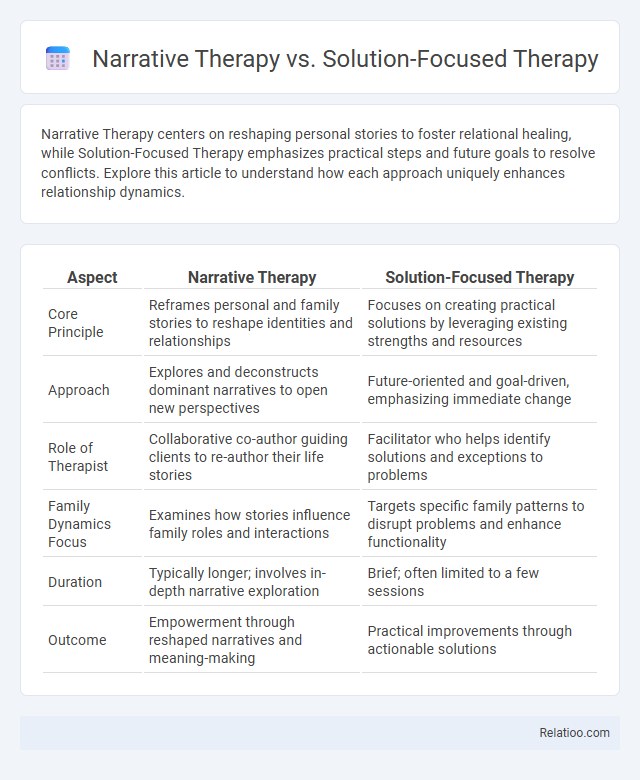Narrative Therapy centers on reshaping personal stories to foster relational healing, while Solution-Focused Therapy emphasizes practical steps and future goals to resolve conflicts. Explore this article to understand how each approach uniquely enhances relationship dynamics.
Table of Comparison
| Aspect | Narrative Therapy | Solution-Focused Therapy |
|---|---|---|
| Core Principle | Reframes personal and family stories to reshape identities and relationships | Focuses on creating practical solutions by leveraging existing strengths and resources |
| Approach | Explores and deconstructs dominant narratives to open new perspectives | Future-oriented and goal-driven, emphasizing immediate change |
| Role of Therapist | Collaborative co-author guiding clients to re-author their life stories | Facilitator who helps identify solutions and exceptions to problems |
| Family Dynamics Focus | Examines how stories influence family roles and interactions | Targets specific family patterns to disrupt problems and enhance functionality |
| Duration | Typically longer; involves in-depth narrative exploration | Brief; often limited to a few sessions |
| Outcome | Empowerment through reshaped narratives and meaning-making | Practical improvements through actionable solutions |
Introduction to Narrative Therapy and Solution-Focused Therapy
Narrative Therapy emphasizes the power of personal storytelling to reshape individual identity and address psychological challenges by externalizing problems and exploring alternative narratives. Solution-Focused Therapy centers on identifying your strengths and resources to foster practical solutions, encouraging a future-oriented approach that focuses on goals rather than problems. Both therapies prioritize empowerment but differ as Narrative Therapy delves into meaning-making through stories, while Solution-Focused Therapy accelerates change with targeted, actionable strategies.
Core Principles of Narrative Therapy
Narrative Therapy centers on the core principle that individuals create meaning through their personal stories, allowing you to re-author your experiences and separate yourself from problems. Unlike Solution-Focused Therapy, which emphasizes future-oriented solutions and goal-setting, Narrative Therapy explores the context and meaning behind issues to empower change. Family Therapy involves relational dynamics and communication patterns among family members, whereas Narrative Therapy focuses primarily on your unique narrative and identity construction.
Key Concepts in Solution-Focused Therapy
Solution-Focused Therapy centers on identifying and amplifying clients' existing strengths and resources to create practical solutions rather than analyzing problems. Key concepts include the miracle question, scaling techniques, and goal-oriented conversations that motivate clients to envision and work toward desired outcomes. Unlike Narrative Therapy's emphasis on reauthoring personal stories or Family Therapy's systemic approach to relational dynamics, Solution-Focused Therapy prioritizes brief, future-focused interventions that facilitate rapid positive change.
Differences in Therapeutic Approaches
Narrative Therapy centers on externalizing problems and rewriting personal stories to empower clients, while Solution-Focused Therapy concentrates on identifying strengths and envisioning future solutions to quickly address specific issues. Family Therapy emphasizes system dynamics and interactions among family members to improve communication and resolve relational conflicts. Your choice depends on whether you seek to reshape personal narratives, focus on immediate problem-solving, or address broader family relationships.
Techniques Used in Narrative Therapy
Narrative Therapy uses techniques such as externalization, where problems are separated from the person, allowing Your experiences to be re-authored and new perspectives to emerge. It emphasizes identifying dominant stories and exploring alternative narratives that empower clients to redefine their identities and relationships. This contrasts with Solution-Focused Therapy's goal-setting and exception-seeking methods and Family Therapy's systemic analysis and communication restructuring.
Solution-Focused Therapy Methods
Solution-Focused Therapy emphasizes identifying your strengths and resources to develop practical, goal-oriented solutions rather than dissecting problems. Techniques like the Miracle Question and scaling help clients envision desired outcomes and measure progress effectively. This method contrasts with Narrative Therapy's focus on re-authoring personal stories and Family Therapy's systemic approach to relational dynamics.
Strengths and Limitations of Narrative Therapy
Narrative Therapy excels in empowering clients to reframe their personal stories, fostering identity reconstruction and enhancing self-awareness through externalizing problems and emphasizing individual strengths. Its limitation lies in the time-intensive process and potential cultural mismatch, as it heavily relies on verbal expression and may not address immediate behavioral changes as effectively as Solution-Focused Therapy or Family Therapy. While Narrative Therapy focuses on meaning-making and personal growth, Solution-Focused Therapy emphasizes quick, goal-oriented solutions, and Family Therapy targets relational dynamics within family systems.
Benefits and Drawbacks of Solution-Focused Therapy
Solution-Focused Therapy emphasizes building on Your strengths and resources, promoting quick, goal-oriented progress by focusing on solutions rather than problems. Its benefits include efficiency and empowerment, making it ideal for clients seeking practical outcomes, but it may overlook deeper emotional issues or underlying psychological patterns. While Narrative Therapy and Family Therapy explore personal stories and relational dynamics more thoroughly, Solution-Focused Therapy prioritizes immediate change, which can limit long-term insight and growth.
Choosing Between Narrative and Solution-Focused Approaches
Choosing between Narrative Therapy and Solution-Focused Therapy depends on your goals and personal narrative. Narrative Therapy emphasizes rewriting your life story to address deep-rooted issues by externalizing problems and exploring meanings, while Solution-Focused Therapy centers on identifying solutions and building actionable strategies for immediate change. Both approaches offer valuable tools, but Narrative Therapy is ideal for those seeking to understand and transform personal identity, whereas Solution-Focused Therapy suits individuals aiming for quick, practical outcomes.
Conclusion: Integrating Narrative and Solution-Focused Practices
Integrating Narrative Therapy and Solution-Focused Therapy enhances therapeutic outcomes by combining the exploration of personal stories with goal-oriented strategies, offering You a comprehensive approach to change. Family Therapy complements this integration by addressing relational dynamics that influence individual and collective narratives. Together, these methods empower clients to reframe experiences and implement practical solutions within their familial contexts.

Infographic: Narrative Therapy vs Solution-Focused Therapy
 relatioo.com
relatioo.com